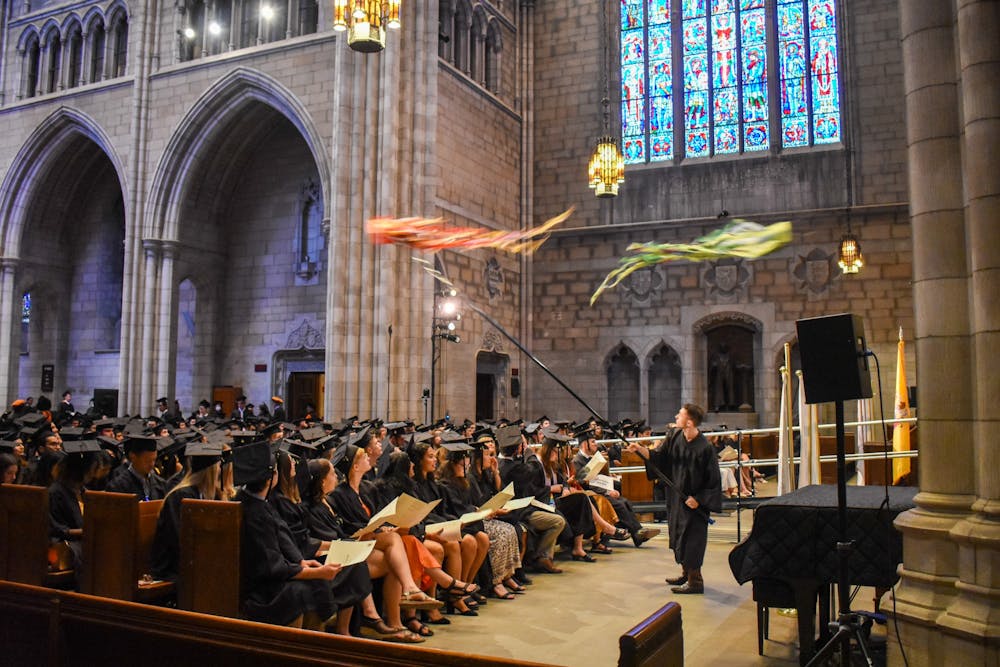Kwame Anthony Appiah, a University professor and ethicist, spoke at the Baccalaureate ceremony for the Class of 2023, speaking about the role of attention, both to oneself and the world, to live an ethical life. The theme connected to using a Princeton education for a life of service to others.
“Inattention can itself arise as a form of injustice,” he said.
The Baccalaureate ceremony dates back to 1760, and until the late 20th century, the University President delivered the oration. Early orations were Christian in character, though former University President Robert Goheen ’40 characterized the ceremony as celebrating an “academic religion” which focuses on the University’s values.
In his welcoming speech, University President Christopher Eisgruber ’83 described the meaning behind the baccalaureate ceremony, the 2023 version described in the commencement program as an “interfaith service” intended to celebrate the religious diversity of the University and the graduation of the senior class.
“The baccalaureate service is intended to provide moments of reflection for members of Princeton’s graduating senior class in between the revelry of reunions and the celebrations of Class Day and Commencement,” he said.
Eisgruber also emphasized the shared pride that Princeton students have in the motto “in the nation’s service and in the service of humanity,” and noted how students engaged with the motto through service, leadership, advocacy, and research.
The connection between service and ethics was apparent in Appiah’s remarks.
Appiah is a current professor of Philosophy and Law at New York University, and as a former professor at Princeton from 2002 to 2014. Notably, Appiah wrote the first book ever chosen for Princeton pre-read, “The Honor Code: How Moral Revolutions Happen.” He also coedited “Africana,” a five-volume encyclopedia of the African and African American experience, and was awarded the National Medal for the Humanities by President Barack Obama.

Appiah also writes as the New York Times’ “Ethicist” responding to readers looking for advice to questions like “My Husband Flies First Class and Puts Me in Coach. Is That Fair?”
Appiah drew an analogy to our place in the philosophical discussion as joining a table where a conversation is already going on.
“Sometimes you arrive at a table in a dining hall where an animated conversation is underway,” he said. “And that acute sense that you’ve entered the conversation late, that’s what it is to be born. The conversation has been going on since the dawn of our species, and we all enter the conversation late.”
He stressed that teachers and peers are there to help people catch up, “alerting us to choices we haven’t previously focused on.”

In his address, Appiah focused on the importance of paying attention to oneself in order to understand one’s interests and passions, citing his choice to switch from medicine to philosophy
He described an ethical life as one where paying attention is habitual. On the other hand, an “attention deficit” results in people not seeing abuse, or discrimination.
“An ethical life can almost be defined in terms of habits of attention,” he said. “To come to grips with what we owe to each other, we have to see each other. We have to recognize that a person sleeping on the street is first and foremost a person.”
As a result, Appiah said that social justice movements demand that people pay attention, and increasingly are based on recognition — “a request that attention be paid.”
Appiah connected the subject matter to modern technological developments, speaking about the about the changes wrought by AI. He said that the current design of large language models and image generators originated from an approach to machine learning that relies on human attention.
During his welcome address, Eisgruber began by taking a moment of silence to remember “the students, staff, faculty, and loved ones who are here with us now only in spirit and in memory.”
The past year was marked by a series of campus tragedies, including the deaths of three undergraduate students, a graduate student, and University staff member.

Members of the Class of 2023 walk into the Chapel with their graduation attire in preparation for Baccalaureate.
Angel Kuo / The Daily Princetonian
A variety of religious traditions were represented in the ceremony.
Following Eisgruber’s address, Shruti Venkat ’23 presented Bhagavad Gita 2:47–48, Abdelhamid Arbab ’23 presented Qur’ān surah 93, Zev Mishell ’23 presented Psalm 19:1–7, and Sebastian Williams ’23 presented James 1:22–27.
The ceremony finished with Dean Theresa Thames of the Office of Religious Life presenting Prayers of the People and Benediction; Dean Alison Boden, also of the Office of Religious Life, presenting the Prayer for Princeton; and Miguel Gracia-Zhang ’23, Johanne S. Kjaersgaard ’23, Liam G. Seeley ’23, and William J. Wade ’23 presenting Blessings.
In her benediction, Dean Thames noted the distinct timing in which the Class of 2023 entered the University, beginning their time at Princeton before the COVID-19 pandemic. “You were the last class to join this University before the world changed,” she said.
The ceremony was the first of an eventful commencement weekend. “Now, as you prepare to make the transition from students to alumni, I hope Princeton’s mission will continue to shape your lives,” Eisgruber said in his opening.
The ceremony took place in the Princeton University Chapel on Sunday, May 28 at 2 p.m.
Isabel Yip is a head news editor for the ‘Prince.’
Please send corrections to corrections[at]dailyprincetonian.com








